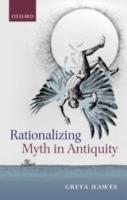
OUP (2018) p/b 290pp £32.99 (ISBN 978 0198831037)
This is the paperback edition of a book originally published in 2014. The questions the author asks and, indeed, answers, are as follows: what contribution has ancient rationalist criticism made to the mythographical tradition and how far does this enable us understand what the ancient Greeks thought about myth-telling and how far they believed in their myths?
H. is Lecturer in Classics and Ancient History at the Australian National University, Canberra. She is well qualified to write this book, describing herself as a specialist in Greek myth, examining ‘ancient—and sometimes more recent—contexts for storytelling, the Greeks’ assessment of mythic phenomena in their own culture’ and how these were interpreted.
Greek myths have always delighted and intrigued. So it comes as something of a surprise to be reminded that there were sceptics, cynics and detractors even in classical times who, in the words of the author, were far from comfortable ‘with the excesses of myth’. This timely book lucidly charts the dissatisfaction and ‘the various attempts made to cut them down to size’.
What really upset the detractors was that myths—fabulous, fantastic and fun—were seen by their aficionados, to some extent at least, as cogent and plausible explanations for actual facts and historical events. Doubts regarding the veracity and plausibility of the myths were articulated initially by the pre-Socratic philosophers Xenophanes and Heraclitus of Ephesus from about 550 BC. Rigorous thinking, empirical analysis, the quest for robust proof, searching questions relating to the nature of god and exposure of more and more Greeks to a wider world through war and colonisation all helped to sow the seeds of doubt and accelerate the debunking of myth. Theagenes of Rhegion added to the debate around 525 BC when he posited a theory that Homer never literally meant what he said—Homer was speaking allegorically and his myths could be deconstructed to reveal an underlying moral truth: the strife of the gods in Homer was actually the strife of the natural elements. In the 3rd century Euhemerus of Sicily (translated by Ennius but now lost) took it a stage further when he answered the question ‘What did the Greek myths do for us ?’ by answering that the Greek gods were originally human, and mythical events were once historical. So far, so good but a dose of sober rationalisation was needed: enter the ancient rationaliser to spoil the party.
Attempts at rationalistic interpretation, not least by a late 4th century treatise, Palaephatus’ Peri Apistôn (On Unbelievable Tales) were the start. Palaephatus’ work comprised an introduction and fifty-two paragraphs on various Greek myths. The first forty-five shared a common format: a brief introduction to a wondrous tale from Greek mythology, usually followed by an exclamation of disbelief (‘This is absurd!’ or ‘This is not likely’ or ‘The true version is…’), and then a sequence of every-day occurrences which gave rise to the wonder-story through misunderstanding. The last seven are equally brief retellings of myth, without any rationalizing explanation.
Palaephatus’ position was somewhere between those gullible people who believed everything that was said to them and those more subtle minds who considered that none of the events recounted in Greek myths ever happened. He had two premises: that every story derived from some past event, and a principle of uniformity, that ‘anything which existed in the past now exists and will exist hereafter’. So there must be some probable series of events behind all myth; but the ‘poets and early historians’ made them into wonderful tales to delight their audience. Palaephatus then claimed to base his work on personal research, travelling far and wide and asking older people what happened in days past. Heraclitus was author of another Peri Apistôn, of particular interest because it exemplified a range of ancient ways of interpreting myth.
Palaephatus and Heraclitus are two of six Greek authors examined; the others are the mythographical Excerpta Vaticana; Conon’s Narratives (late 1st C BC), Plutarch’s Life of Theseus and Pausanias’ Description of Greece, thus extending the range of the book from the 4th C BC to the 2nd C AD. H. uses these authors and their work to argue convincingly that the rationalisation of myth should be deployed as an integral part of studies relating to myth, that it is an essential component of any analysis and interpretation of Greek myth.
In short, a valuable addition to the literature on Greek myth which should be read by anyone if they want to have a complete and rounded understanding of the subject. The book has an Index Locorum, a General Index and an extensive bibliography. The two (useful) appendixes give us ‘The Date and Authenticity of Palaephatus, Peri Apistôn and a translation of Anon., Peri Apistôn’.
Paul Chrystal is author of War in Greek Myth (2019) and War in Roman Myth & Legend (in press). www.paulchrystal.com
